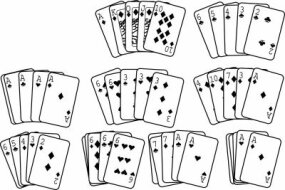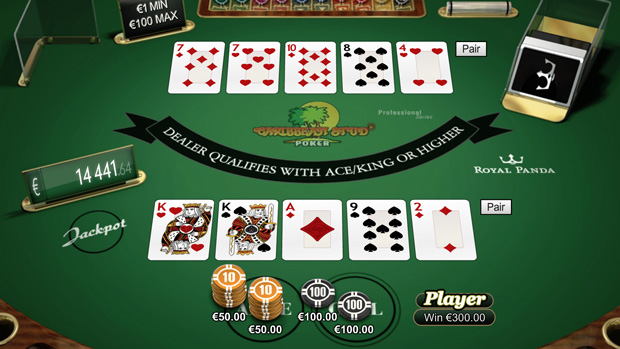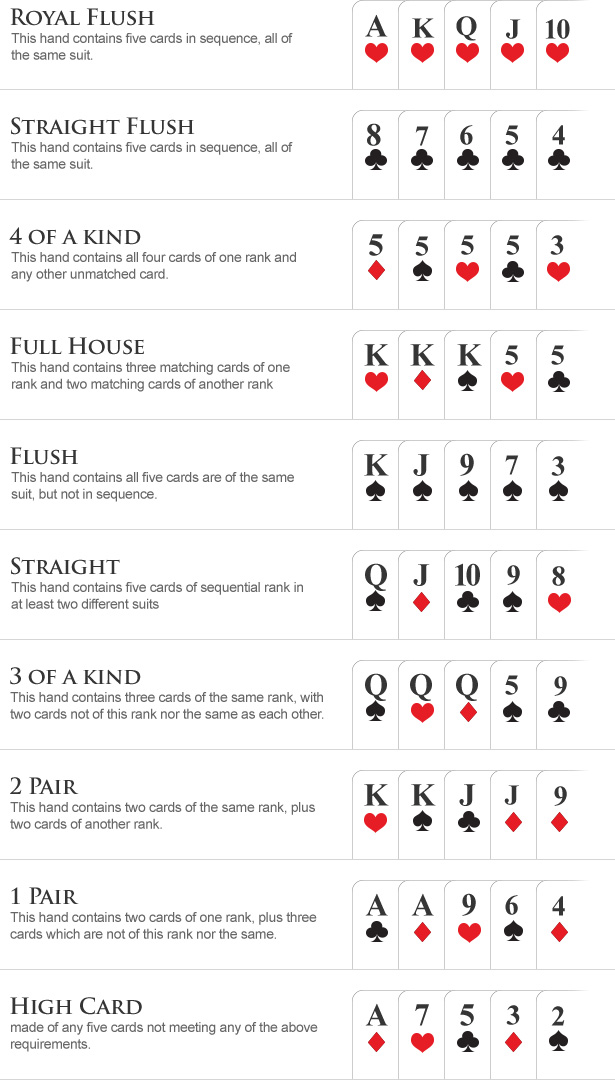How To Play Poker
- Play Online Poker Games
- How To Play Poker Instructions
- How To Play Poker At Home
- Poker Rules
- How To Play Poker Face Clarinet
CardPlayer.com is the world's oldest and most well respected poker magazine and online poker guide. Since 1988, CardPlayer has provided poker players with poker strategy, poker news, and poker. Poker is a game of strategy. You'll need to constantly read the other players to decide when to hold 'em, when to fold 'em, when to bluff, and when to call s.
In hold'em, players receive two down cards as their personal hand (holecards), after which there is a round of betting. Three board cards are turned simultaneously (called the flop) and another round of betting occurs. The next two board cards are turned one at a time, with a round of betting after each card. The board cards are community cards, and a player can use any five-card combination from among the board and personal cards. A player can even use all of the board cards and no personal cards to form a hand ('play the board'). A dealer button is used. The usual structure is to use two blinds, but it is possible to play the game with one blind, multiple blinds, an ante, or combination of blinds plus an ante.Rounds of Betting
- Opening deal- Each player is dealt two cards face down, which are known as hole cards or pocket cards.
- First round of betting- Starting with the player to the left of the big blind, each player can call the big blind, raise, or fold. The big blind has the option to raise an otherwise unraised pot.
- The flop- The dealer burns a card, and then deals three community cards face up. The first three cards are referred to as the flop, while all of the community cards are collectively called the board.
- Second round of betting- Starting with the player to the left of the dealer button, each player can check or bet. Once a bet has been made, each player can raise, call, or fold.
- The turn- The dealer burns another card, and then adds a fourth card face-up to the community cards. This fourth card is known as the turn card, or fourth street.
- Third round of betting- It follows the same format as the second round, but the size of the bets have usually doubled in limit games.
- The river- The dealer burns another card, and then adds a fifth and final card to the community cards. This fifth card is known as the river card, or fifth street.
- Final round of betting- It follows the same format as the second and third rounds.
- The showdown- Using the best five-card combination of their hole cards and the community cards, the remaining players show their hands, with the bettor or last raiser showing first. The highest five-card hand wins the pot. (In case of a tie, the pot is evenly split among the winning hands.)
- These rules deal only with irregularities. SeeButton and Blinduse for rules on that subject.
- If the first or second hole card dealt is exposed, a misdeal results. The dealer retrieves the card, reshuffles, and recuts the cards. If any other holecard is exposed due to a dealer error, the deal continues. The exposed card can not be kept. After completing the hand, the dealer replaces the card with the top card on the deck, and the exposed card is then used for the burncard. If more than one hole card is exposed, this is a misdeal and there must be a redeal.
- If the flop contains too many cards, it must be redealt. (This applies even if it is possible to know which card is the extra one.)
- If the flop needs to be redealt because the cards were prematurely flopped before the betting was complete, or the flop contained too many cards, the board cards are mixed with the remainder of the deck. The burn card remains on the table. After shuffling, the dealer cuts the deck and deals a new flop without burning a card.
See Explanations,discussion #2, for more information on this rule. - If the dealer turns the fourth card on the board before the betting round is complete, the card is taken out of play for that round, even if subsequent players elect to fold. The betting is then completed. The dealer burns and turns what would have been the fifth card in the fourth card's place. After this round of betting, the dealer reshuffles the deck, including the card that was taken out of play, but not including the burn cards or discards. The dealer then cuts the deck and turns the final card without burning a card. If the fifth card is turned up prematurely, the deck is reshuffled and dealt in the same manner.
See Explanations,discussion #2, for more information on this rule. - If the dealer mistakenly deals the first player an extra card (after all players have received their starting hands), the card is returned to the deck and used for the burn card. If the dealer mistakenly deals more than one extra card, it is a misdeal.
- If you are playing the board, you must so declare before you throw your cards away; otherwise you relinquish all claim to the pot.
Table Of Contents
Other Poker Game’s Rules:
Learning how to play poker should not be difficult. If you want to understand why so many people love this game, this beginner's guide to the rules and the basics of poker is all you need.
Poker is a simple game to learn, but the poker rules can be challenging for a complete beginner.
But don't let that put you off. It is not hard to learn how to play poker, and you can move from the basics of the game to the tables of the top online poker sites in no time.
Here's everything you'll learn in this guide on how to play poker:
- And lots more
Before you move to the 'practical' side of this guide on how to play the most popular variants of this game, you need to learn the basics of poker.
When most people say they want to know 'how to play regular poker,' they imply that they want to learn the basics of Texas Hold'em.
Texas Hold'em is (by far) the most popular poker game out there and it's the one you find at every online poker site.
But that's just the tip of the iceberg. With so many poker variants to play online and offline, the only proper guide on how to play poker for dummies is the one that gets you access to all the best games out there.
Not just to the most famous one.

Many poker rules are consistent from game to game, although among the dozens of variants such as Texas hold'em, Omaha, and seven-card stud you will find some ket differences you need to kno.
Let's have a quick look at the poker rules of the most played poker games online:
How to Play Texas Hold'Em
| Game | Texas Hold'em |
| How Many Players | 2-10 |
| Poker Rules | How to play Texas hold'em |
Also called the 'Cadillac of Poker,' Texas hold'em is the one you are going to play over and over again.
This is the most popular poker game online and it is also the one you are most likely to play with our friends in your next home game.
Whether you play it in the form of a tournament or as a ring-game, the basic poker rules and the hand rankings don't change.
> Discover how to play Texas Hold'em
How to Play Omaha Poker
| Game | Omaha Poker |
| How Many Players | 2-10 |
| Poker Rules | How to play Omaha |
| Where to Play | Top poker sites |
The second-most popular poker variant. Omaha poker finds its roots in the game of Texas Hold'em, although the rules of the two games are slightly different from each other.
Many players find learning how to play poker Omaha to be the natural step to take after they have successfully mastered the basics of Texas Hold'em.
In the poker rules page dedicated to the game, you find the perfect beginner's guide to moving your first steps in the world of Omaha.
> Learn how to play Omaha poker
Play Online Poker Games
How to Play Seven-Card Stud
| Game | Seven-Card Stud |
| How Many Players | 2-8 |
| Poker Rules | How to play 7-card Stud |
| Where to Play | Top poker sites |
Before Texas hold'em became king, anyone who wanted to learn the basic poker rules and how to play poker had to go through the game of seven-card stud.
As the name suggests, this is a variant of stud poker. 7-card stud is also the 'S' game in the H.O.R.S.E. poker — but if you are still learning how to play poker, it's probably too early for you to jump on that.
> Discover how to play seven-card stud poker
Other Poker Rules to Learn


If you want to go deeper and you want to learn how to play even more poker games, PokerNews is the right site for you.
Pick one poker variant to learn from the list that follows and find out how to play some of the most exciting and lesser-known poker games out there!
Use these guides to learn how to play poker and master not only the most 'obvious' games like Texas hold'em bu also all the other different variants out there.
In our guides for beginners, you find the official poker rules, the basic strategy tips, and the hand rankings — because knowing how to calculate points is key if you want to win at poker.

Common Traits of Most Poker Rules
The Value of Poker Hands
One element used in most poker variants is the system of hand rankings.
The highest ranked hand is a Royal Flush (five cards of the same suit, ranked ace through ten), followed by a Straight Flush (five cards of the same suit of consecutive ranks).
The third-best combination is the Four-of-a-kind, which is then followed by the Full House (three of a kind plus one pair), the Flush, the Straight, the Three-of-a-kind, Two Pair, One Pair, and High Card or no pair.
When a hand reaches the showdown, the player with the highest-ranked hand wins the pot.
That's true of Texas hold'em, pot-limit Omaha, seven-card stud, and five-card draw.

Of course, in 'lowball' games like razz or deuce-to-seven triple draw, the hand rankings are turned upside down and the 'worst' hand according to traditional hand rankings is the winning one.
Poker Hands Ranking
- Royal Flush10JQKA
- Straight
Flush56789 - Four Of
A Kind3333K - Full HouseJJJKK
- Flush2459K
- StraightA2345
- Three Of
A Kind45777 - Two Pair499KK
- One Pair3QK1010
- High Card248QK
Suggested Readings
- Poker Hands Chart: The official classification of all poker hands with a free pdf to download and print.
- What Beats What in Poker: the perfect starting guide to learn how to count points in poker and discover the real value of each hand.
Blinds and Ante Bets
Games like hold'em and Omaha feature small and big blinds, so called because they are 'blind' bets players have to make before they are dealt any cards.
Meanwhile stud games usually use 'antes', which also involve players putting chips in the middle before the hand begins.
From there players bet more as the hand progresses, thereby creating larger pots.
Limit vs. No Limit Poker Games
Some games are played with no-limit betting, which means players can bet as much as they like at any point in the hand, including going 'all in.'
Pot-limit betting means that the current size of the pot creates an upper limit on how much a player can bet.
Games that are played with fixed-limit betting have predetermined amounts from which players cannot vary when they make their bets and raises.
The Action
There are other terms that tend to be used in all different poker games, including many having to do with the actions you perform when playing.
When the action is on you, you can:
- Check: Decline to bet
- Fold: Withdraw from the hand, if someone else has bet already
- Bet: Place a wager on the table
- Raise: Add more chips by matching your opponent's bet and putting in a greater amount.
- Call: Match the bet of your opponents to stay in the hand and continue to play.
All of those terms are an important step in your journey to learn how to play poker since they tend to come up in all poker variants.
The Betting Rounds
In games with community cards like hold'em and Omaha (also sometimes called 'flop games'), the betting rounds are referred to as:
- Preflop: The bets made before any community cards are dealt
- Flop: The bets made after the first three community cards are dealt)
- Turn: The bets made after the fourth community card
- River The bets made after the fifth and last community card.
Suggested Readings
- How to bet in poker: a beginner's guide to betting in Texas hold'em.
- Texas hold'em betting tips: This short article gives you some actionable tips to learn how to play poker with your stack of chips.
The Table Stakes
One other poker rule common to just about every variant of the you'll play – whether you are playing live poker or online poker – is one called 'table stakes.'
Table stakes means that once a hand begins, you can only bet whatever amount you had on the table to begin the hand and are not allowed to add anything more during the hand as it plays out.
If you only have $100 on the table to begin a hand, you can't pull out your wallet and add more halfway through the hand – you can only play out the hand with whatever you had to start.
Practice Poker Online for Free
How To Play Poker Instructions
Now that you know the basic poker rules and you have links to go back to your poker guides when you need to, it's time to look for the best websites to practice poker online.
Don't start to play poker for real money right away. Try out the games for free first. That's the only way to discover if you have really learned how to play poker.
How To Play Poker At Home
Looking for a site to practice online poker for free?
Don't miss the updated list of the best free poker sites in 2020!
There are countless options to give the game a test run, but the best way is to try out the real deal.
Poker Rules
Sign up for a poker account with one of the big online poker rooms and give the freerolls a try.
That way, you can practice poker online without any risk; you're not wagering any money.
And if you want to try out cash games instead of tournaments, all major poker sites online have so-called play money tables.
That way you can practice the game, learn the rules, and figure out how the software works, readying yourself for the big stage.
How To Play Poker Face Clarinet
Register a free gaming account and test your poker knowledge in the next freeroll!